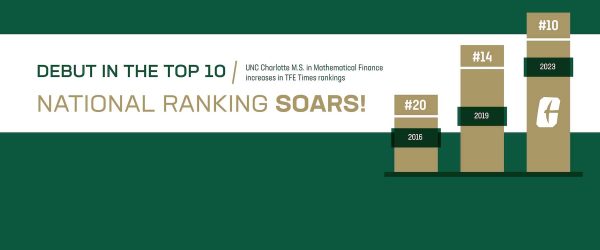Master of Science in Mathematical Finance moves into Top 10 in national ranking

Charlotte’s Master of Science in Mathematical Finance program is judged one of the best in the nation, soaring into the Top 10 in TFE Times’ Best Master’s of Financial Engineering programs rankings for 2023.
“We continue to demonstrate why we rank among the most highly regarded financial engineering programs,” said M.S. Math Finance Program Director Yufeng Han. “With our focus on innovative coursework, collaborative research and teaching, and responsiveness to students and employers, we have moved up 10 slots in the TFE Times assessment since 2016.”
Charlotte, the second-largest financial center in the United States, relies on UNC Charlotte to supply talent and new financial knowledge to drive the region’s economy. As a STEM-designated program of the departments of Finance and Economics in the Belk College of Business and the Department of Mathematics and Statistics in the College of Liberal Arts & Sciences, the program draws its strength from the three disciplines and its home within one of the top AACSB accredited business schools in North Carolina.
“Our program is specifically designed to fulfill the needs of the growing field of math finance,” said Taufiquar Khan, chair of the Department of Mathematics and Statistics. “Increasingly companies rely upon highly sophisticated mathematical models to identify, measure, and manage risk, and they need people who can analyze data and use these complex models effectively. This is particularly true for financial institutions, investment banks, and commodities firms, all major employers of our graduates.”
Students come to the Charlotte program with a variety of undergraduate backgrounds, including finance, mathematics, economics, computer science, actuarial science, statistics, information systems and engineering.
“Our students gain a solid background from the three disciplines, helping them grow their skills with depth and breadth,” said Ethan Chiang, chair of the Department of Finance. “They learn from faculty who are passionate about research and discoveries and who also are committed to student and alumni success. They are able to apply what they are learning to real-world problems, with highly qualified mentors guiding them.”
Close connection with the financial sector in Charlotte also sets the program apart, Han said. “We hear directly in conversations with financial leaders, hiring managers and alumni what our graduates need to know and be able to do as they pursue careers in the broad quantitative finance field,” he said. “These collaborations are invaluable for our program’s focus and for the success of our graduates.”
Students gain from the program’s intentional approach. They take prerequisite courses if they need to prepare for advanced subjects in which they have less experience. Students may use electives to tailor the program to their specific interests. They also benefit from the program’s flexibility in offering full-time, part-time and early-entry options and its continuing assessment of program needs, such as the addition of a new fintech concentration.
The TFE Times rankings are among the most comprehensive for graduate financial engineering, financial mathematics, quantitative finance, computational finance and mathematical finance programs in the country. The rankings are calculated based on components including average test scores, starting salaries, undergraduate GPA, acceptance rates and graduate employment rates.